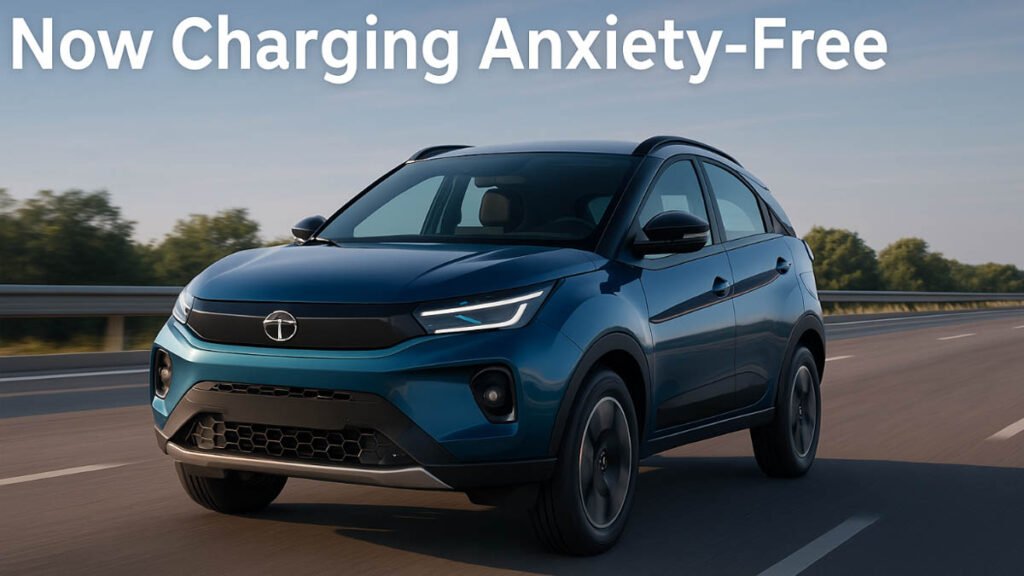Tata EV Battery Breakthrough Could Kill Charging Anxiety in 2025.
EV owners are familiar with the battle: low battery, no charger in sight, and the dreaded onset of charging anxiety. The most recent invention from the Tata Group, however, may allay those concerns.
Compared to existing lithium-ion solutions, the next-generation solid-state EV battery technology unveiled by the Indian auto giant claims to charge more quickly, last longer, and remain safer. If this plays out as expected, Tata could revolutionize India’s EV space — and even take on Tesla and BYD globally.
So, what exactly is this new battery tech, and why is everyone talking about it? Let’s break it down.
Know More About Tata EV Battery Breakthrough
🔋 What’s Novel About Tata’s Innovation in EV Batteries?
The Tata Group is working on solid-state battery cells, the holy grail of electric vehicle power, through its subsidiary Tata AutoComp and in collaboration with foreign partners.
Unlike liquid electrolytes, which can overheat or catch fire in traditional lithium-ion batteries, solid electrolytes are utilized in solid-state batteries. Now, they are:
- More energy-dense (more range for the same size),
- Faster to charge, and
- More stable over time.
Tata’s early tests suggest their batteries could enable EVs to fully charge in under 20 minutes and offer up to 1,000 km of range — a game-changer in Indian road conditions.
🚗 Why This Might Be Very Important for India
Let’s be honest: The EV infrastructure in India is still being developed. Public charges are still erratic, and long-distance EV driving frequently feels risky.
Tata’s innovation is crucial in this situation:
More range means fewer pauses for charging.
Less waiting means faster charging.
Increased safety reduces driving stress and the heat in India.
Furthermore, with models like the Nexon EV and Tiago EV, Tata already controls a large portion of the Indian EV market. Adoption would skyrocket if such cars had twice the range and faster charging.
🌐 How About International Competition?
Tata is not the only competitor in the solid-state technology competition. Billions are also being invested in this technology by well-known companies including Samsung, QuantumScape, and Toyota.
What distinguishes Tata, though?
- Localization: They are addressing domestic issues with an emphasis on India first.
- Affordability: Tata wants these batteries to be practical for EVs that aren’t only luxury models.
- Vertical integration: Tata already owns everything from steel to auto to energy — making in-house scaling more realistic.
If Tata nails the pricing and reliability, they could even start exporting to Southeast Asia, Africa, or Europe.
🔍 What Time Will This Be on the Market?
Although Tata has not yet announced a formal launch date, industry insiders suggest that pilot production will begin in late 2025 and that commercial production will follow in early 2026.
In order to give the public a first sight at the battery in operation, they are also anticipated to display early versions during the Auto Expo 2026.
🤖 Concluding remarks
There is more to Tata’s EV battery initiative than just high-tech. It aims to address charging anxiety, a real-world issue that affects millions of EV customers today and in the future.
An EV revolution might be sparked not only in India but also around the world if they fulfill even half of their promises. We’ll be keeping our chargers close at hand till then, albeit perhaps not for long.
You May Read: Upcoming Cars in 2025: MG’s Innovative Electric Models to Reshape the Market
FAQs
What makes Tata’s new EV battery different from current ones?
Tata is developing solid-state batteries, which use a solid electrolyte instead of liquid. This makes them safer, more energy-efficient, and faster to charge.
How fast will Tata’s EV battery charge?
Early reports suggest under 20 minutes for a full charge — significantly faster than the 60–90 minutes typical for lithium-ion batteries.
Will this battery work with existing Tata EVs?
Not immediately. New vehicle models will likely be designed around this battery tech, although future upgrades may be possible.
Is Tata the only Indian company working on this?
While Tata is leading the race, others like Ola Electric and Mahindra are also exploring next-gen battery solutions, though solid-state is still in early stages for most.
When can I buy a Tata EV with this new battery?
Commercial rollout is expected by 2026, but demo versions could be shown as early as Auto Expo 2026.
